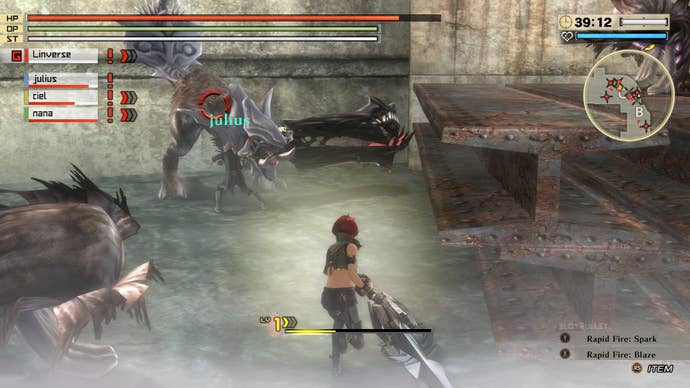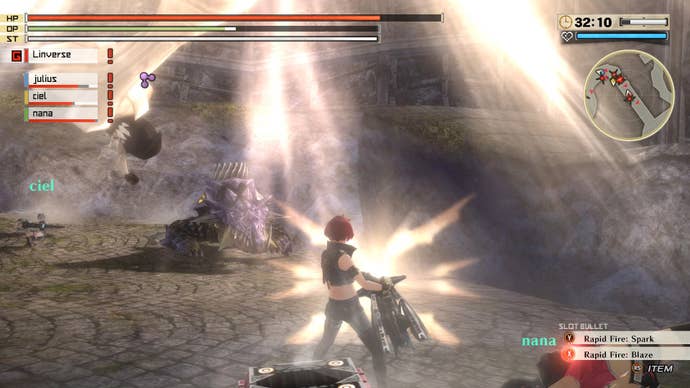God Eater 2: Rage Burst Gets the Monster Hunter Basics, but None of the Nuance
While this might be the closest you'll come to playing Capcom's hit RPG on the PC, you may be better off just buying a 3DS.
This article first appeared on USgamer, a partner publication of VG247. Some content, such as this article, has been migrated to VG247 for posterity after USgamer's closure - but it has not been edited or further vetted by the VG247 team.
For me, this has been the summer of Monster Hunter. Thanks to the recently released Generations, I've been finding myself turning to the world of Monster Hunting whenever I get some free time—sorry, just about everything else that's been released this summer.
And this somewhat recent fascination with Monster Hunter has made me a lot more aware of the many clones that've tried to copy its unique style. Most of them popped up around the turn of the last decade, when Capcom's series had reached its peak popularity, though none of them managed to have the same staying power as their inspiration. God Eater, originally released in 2010 for the PSP—and under the name "Gods Eater" in America, presumably because the eating of one god might be considered blasphemous—made for one of the earliest Monster Hunter clones, though its 2013 sequel never saw a release. With Monster Hunter transforming into such a modest hit in America, then, it's not surprising to see Bandai-Namco strike while the iron's hot by releasing a PC, PlayStation 4, and Vita version of God Eater 2: Rage Burst in the wake of Generations.

If you've played as much Monster Hunter as me, jumping right into God Eater amounts to a somewhat strange experience—like expecting the taste of Coca-Cola, only to realize you accidentally bought the generic store-brand soda. All in all, God Eater keeps the same basic Monster Hunter structure: You operate out of a central hub, go on missions to fight large beasts that can often take 10-15 minutes to kill (or longer), then return with your loot to craft new weapons to take on more difficult challenges. Heck, even some of the button placement is the same as Monster Hunter, as if developer Shift knew exactly who their audience would be.
The biggest change to the overall structure to the Monster Hunter formula amounts to a shoehorned-in story that isn't offensive, but feels like your off-the-shelf anime plotline most people would tune out of after the first few episodes. If anything, God Eater's story—what little of it I could tolerate, anyway—made me grateful that Monster Hunter has the confidence to wash its hands of this element almost entirely. (But I'm guessing Capcom never really had body pillows in mind when launching their series.)
God Eater's Monster Hunter borrowing doesn't stop there. From the outset, you can decide to specialize in one of six weapon types, each with their own attacks, combos, and special moves. Ranged weapons also make an appearance, but they serve a much more subordinate function in God Eater: Rather than rolling with one as your main, you choose one of four gun types that you can switch your melee weapon into on the fly with the press of a button. God Eater's means of offense differ in that they operate on a traditional experience system, meaning if you use one long enough, you can move yourself down one of several skill trees and reap the rewards of passive buffs and unlocked abilities. There's also a bit more of a focus on customizing weapons individually: Weapon-specific boosts called "God Arc Parts" are earned at the end of missions, and can be slotted into the appropriate weapons to tailor them more to your play style.
Shift definitely knows what they're trying to copy, here, so it's a shame the actual action doesn't come close to matching the studied, methodical combat of Monster Hunter—though that may be an upside for some of you. Simply put, God Eater feels like it's half Monster Hunter, and half Dynasty Warriors: Sure, you have your tense, drawn out battles with huge creatures, but the combat often takes the form of artless button-mashing, with none of the physicality that makes Monster Hunter games feel so good to play. For lack of a better word, God Eater just feels cheap. That may be because I'm playing a game meant for the Vita on a gaming PC, but the attention to detail that keeps me consistently impressed with Monster Hunter (and on the 3DS' small screen, no less) is nowhere to be found here. The general design of just about everything—from monsters to weapons to characters—is tacky and garish, and laced with a bit of skeeviness that points directly to its Vita roots.

The battlefields themselves are even more disappointing, as they don't aspire to be much more than large, open arenas built with some fairly simple geometry. Shift definitely gets credit for trying to outdo Monster Hunter's segmented maps with God Eater's large, interconnected areas, but the execution isn't very graceful. They're essentially the same segmented maps, connected by what I'd call "outdoor" hallways, which subtract much of the fun involved in chasing down a wounded monster. Monster Hunter always gave you the opportunity to sneak up on a target as it ate or slumbered to heal up after an intense battle, but in God Eater, they just sort of lumber away and stand in a random corner, like the game designer just gave them a time-out. Again, it's just one of many God Eater choices that make me appreciate the design of Monster Hunter all the more.
It may seem unfair to keep invoking the name of Monster Hunter, but let's not forget that God Eater is essentially setting out to be the Transmorphers to Capcom's Transformers. That's not to say God Eater is completely without merit, but unfortunately, we live in a world where things are defined by their relationships to other things, and it's hard to ignore that there's a much better version of this experience to be had elsewhere. Of course, it's completely possible to borrow the Monster Hunter formula and actually make it work: Metal Gear Solid: Peace Walker's extended robot boss battles are an excellent example of this.
But when playing God Eater 2: Rage Burst, I could only think how much better my time would be spent with the Monster Hunter I know and love. On the bright side, God Eater 2 could give gamers outside of the 3DS landscape a similar taste to what Monster Hunter has to offer, but still, there's nothing like the real thing.

